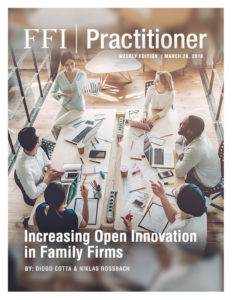
View this edition in our enhanced digital edition format with supporting visual insight and information.
Family firms, like all modern businesses, must depend on growing levels of innovation in order to survive in an increasingly competitive global marketplace. This week, Diogo Cotta and Niklas Rossbach from Maastricht University discuss some alarming trends concerning innovation in family businesses and introduce a research project they’re conducting to learn more about how family businesses approach innovation opportunities.
Family firms are the backbone of the world economy. All over the globe they have remained the juggernauts of continuity that sustain long-term investments, provide for multiple generations of family members, and enable the development of entire communities. Like all modern business organizations, however, family firms are having to contend with severe competitive pressures brought forth by a global marketplace and an unrelenting pace of technological change. In such a cutthroat environment, survival wholly depends on securing growing levels of innovation capacity.
Home advantage no longer a safe assumption
If family firms want to adapt to forthcoming disruptions in product and service markets, they will be increasingly challenged to improve their overall capacity to innovate as well as to absorb external innovations. Up until now family firms´ innovation performance thrived under the stability provided by a long-term vision and consistent managerial support for internal R&D initiatives. The nature of the innovation game has changed, though. Home advantage is not a safe assumption anymore.
Our collective scientific and technical achievements have produced a complex world of specialized expertise and interdependent technological ecosystems. Innovative firms can no longer rely on their internal capabilities alone. R&D is now an open, collaborative activity with lone wolfs succumbing to rapid obsolescence. In order to continuously improve their innovation performance and get access to state-of-the-art developments, family firms will have to expose themselves to a broad set of partners –from universities and government agencies to suppliers, customers and, even, competitors.
Unfortunately, there is worrying evidence that most family firms still shun external partnerships when it comes to innovation activities. Findings from a series of recent studies strongly suggest that family firms are less willing to participate in open innovation projects than nonfamily firms. Family firms reveal a higher risk aversion to sharing the fate of their R&D investments with outside agents, no matter how uniquely competent. Regrettably, it is unlikely they will continue to afford doing so.
As researchers and professional advisers try to boost family firms´ long-term sustainability, we need to gain a better understanding of what is keeping family firms from fully embracing the open innovation paradigm. Is it the nature of the partner? Is it the fear to lose control of a core activity? Is it the inability to productively absorb external knowledge and expertise? If we are to find ways out of the problem, we need to understand its sources.
A research project
Our current knowledge about the engagement of family firms in open innovation is basic, yet the signs are very concerning. The first step towards increasing the rate of open innovation in family firms is to identify the deterring motives. This international research project, OpenUp, is collecting information on the factors that are discouraging family firms from opening up their R&D processes and capitalize on the unique capabilities of external partners. Our main goal is to examine the decision-making attributes family firms deploy when considering open innovation opportunities.
The results will allow for a deeper understanding of family-rooted firms and their innovation behavior. This insight will lay the basis for a more promising approach to advising clients on the benefits and challenges of open innovation. It will also deepen academics’ understanding of family firms.
About the study
Conducted by researchers from the Dutch University Maastricht, this study is a questionnaire for CEO’s and owners of family firms. The study is currently in the data collection phase and is being distributed among professionals in Western Europe and North America.
If you or your clients are interested in taking part in the OpenUP study, click here for a short questionnaire (average response time: 7m). Data collection will close on April 30. Those who partake in the survey will be informed how they rank in their innovation behavior compared to other participants, whilst getting access to an executive summary of the study.
About the contributors
 Diogo Cotta is an assistant professor of supply chain strategy at Maastricht University, in the Netherlands. His work bears on topics of supplier involvement, innovation strategy and disruption management in manufacturing firms. He is currently coordinating a research project on innovation partnerships between family firms and their suppliers. Diogo can be reached at [email protected].
Diogo Cotta is an assistant professor of supply chain strategy at Maastricht University, in the Netherlands. His work bears on topics of supplier involvement, innovation strategy and disruption management in manufacturing firms. He is currently coordinating a research project on innovation partnerships between family firms and their suppliers. Diogo can be reached at [email protected].
 Niklas Rossbach is a research assistant at the department of marketing and supply chain management at Maastricht university. His research interests are in the area of innovation strategy in family firms. He is currently pursuing a master´s degree in strategic marketing. Niklas can be reached at [email protected].
Niklas Rossbach is a research assistant at the department of marketing and supply chain management at Maastricht university. His research interests are in the area of innovation strategy in family firms. He is currently pursuing a master´s degree in strategic marketing. Niklas can be reached at [email protected].

View this edition in our enhanced digital edition format with supporting visual insight and information.





